Father Damien - Apostle of the Lepers
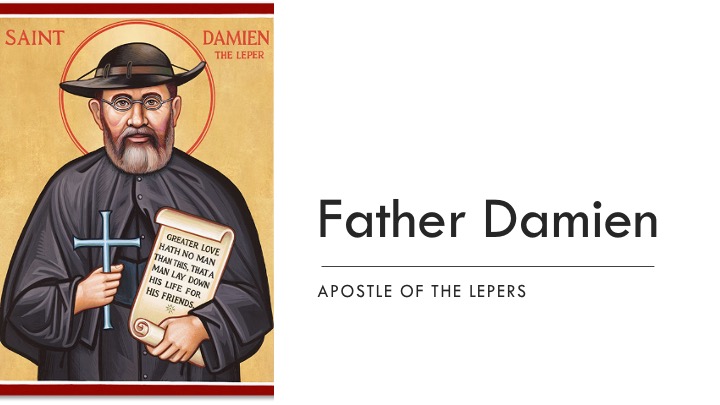
Welcome back to class (via Zoom). Chris Knepp returns and as part of our Great Christians series gives us an in-depth view of Father Damien - the Apostle of the Lepers.

This is Father Damien as a young man.
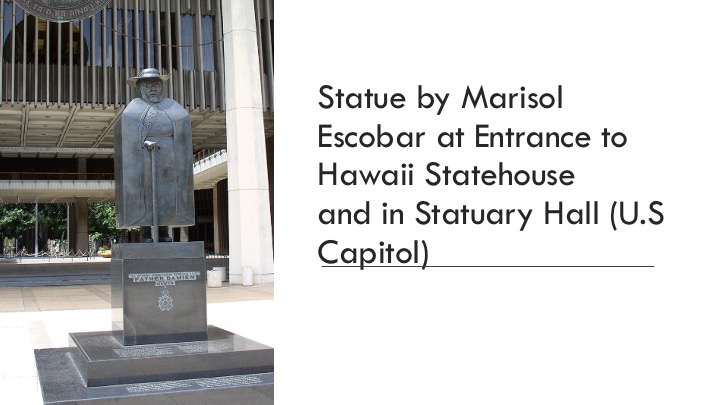
And a statue of Father Damien at the entrance to the Hawaii Statehouse. Father Damien's statue is also in Statuary Hall in the US Capitol, one of the two statues that Hawaii has put in Statuary Hall.
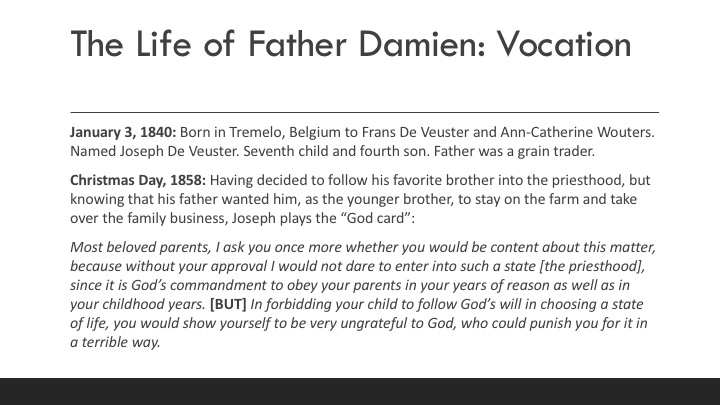
The Life of Father Damien: Vocation
January 3, 1840: Born in Tremelo, Belgium to Frans De Veuster and Ann-Catherine Wouters. Named Joseph De Veuster. Seventh child and fourth son. Father was a grain trader.
Christmas Day, 1858: Having decided to follow his favorite brother into the priesthood, but knowing that his father wanted him, as the younger brother, to stay on the farm and take over the family business, Joseph plays the “God card”:
Most beloved parents, I ask you once more whether you would be content about this matter, because without your approval I would not dare to enter into such a state [the priesthood], since it is God’s commandment to obey your parents in your years of reason as well as in your childhood years. [BUT] In forbidding your child to follow God’s will in choosing a state of life, you would show yourself to be very ungrateful to God, who could punish you for it in a terrible way.
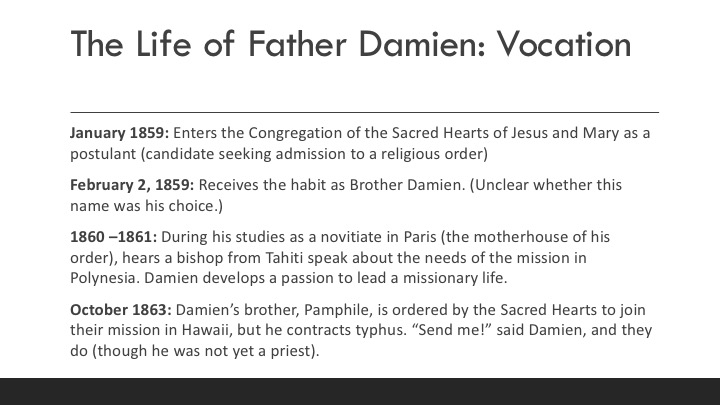
The Life of Father Damien: Vocation
January 1859: Enters the Congregation of the Sacred Hearts of Jesus and Mary as a postulant (candidate seeking admission to a religious order)
February 2, 1859: Receives the habit as Brother Damien. (Unclear whether this name was his choice.)
1860 –1861: During his studies as a novitiate in Paris (the motherhouse of his order), hears a bishop from Tahiti speak about the needs of the mission in Polynesia. Damien develops a passion to lead a missionary life.
October 1863: Damien’s brother, Pamphile, is ordered by the Sacred Hearts to join their mission in Hawaii, but he contracts typhus. “Send me!” said Damien, and they do (though he was not yet a priest).
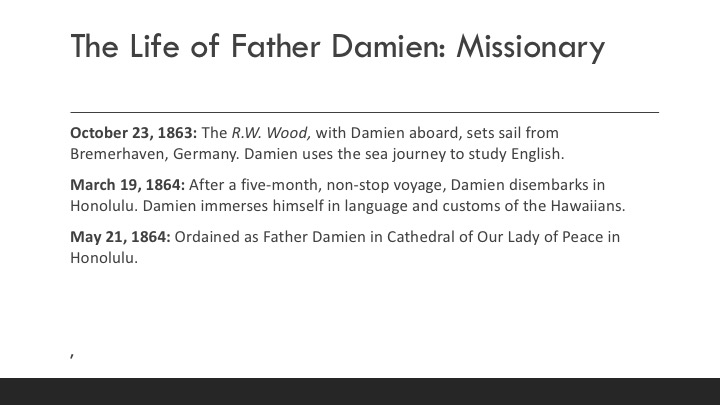
The Life of Father Damien: Missionary
October 23, 1863: The R.W. Wood, with Damien aboard, sets sail from Bremerhaven, Germany. Damien uses the sea journey to study English. And as we will see he had plenty of time to study.
March 19, 1864: After a five-month, non-stop voyage, Damien disembarks in Honolulu. Damien immerses himself in language and customs of the Hawaiians.
May 21, 1864: Ordained as Father Damien in Cathedral of Our Lady of Peace in Honolulu.
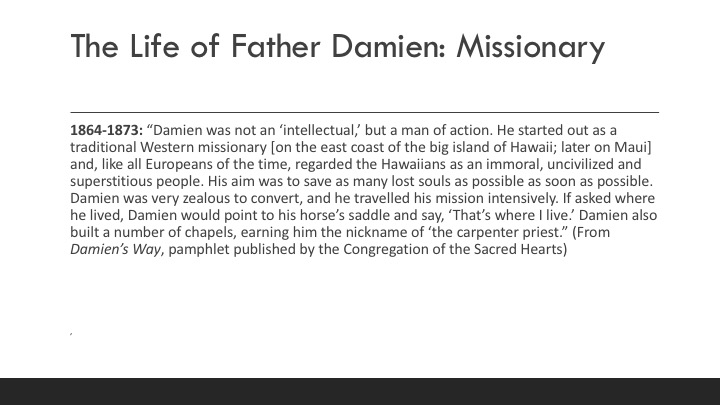
The Life of Father Damien: Missionary
1864-1873: “Damien was not an ‘intellectual,’ but a man of action. He started out as a traditional Western missionary [on the east coast of the big island of Hawaii; later on Maui] and, like all Europeans of the time, regarded the Hawaiians as an immoral, uncivilized and superstitious people. His aim was to save as many lost souls as possible as soon as possible. Damien was very zealous to convert, and he travelled his mission intensively. If asked where he lived, Damien would point to his horse’s saddle and say, ‘That’s where I live.’ Damien also built a number of chapels, earning him the nickname of ‘the carpenter priest.” (From Damien’s Way, pamphlet published by the Congregation of the Sacred Hearts)
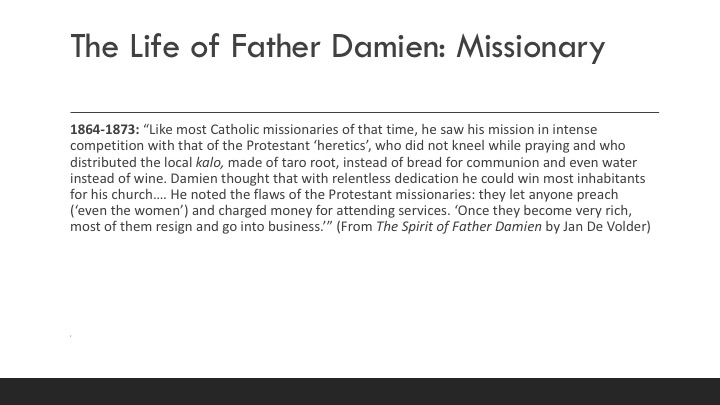
The Life of Father Damien: Missionary
1864-1873: “Like most Catholic missionaries of that time, he saw his mission in intense competition with that of the Protestant ‘heretics’, who did not kneel while praying and who distributed the local kalo, made of taro root, instead of bread for communion and even water instead of wine. Damien thought that with relentless dedication he could win most inhabitants for his church…. He noted the flaws of the Protestant missionaries: they let anyone preach (‘even the women’) and charged money for attending services. ‘Once they become very rich, most of them resign and go into business.’” (From The Spirit of Father Damien by Jan De Volder)
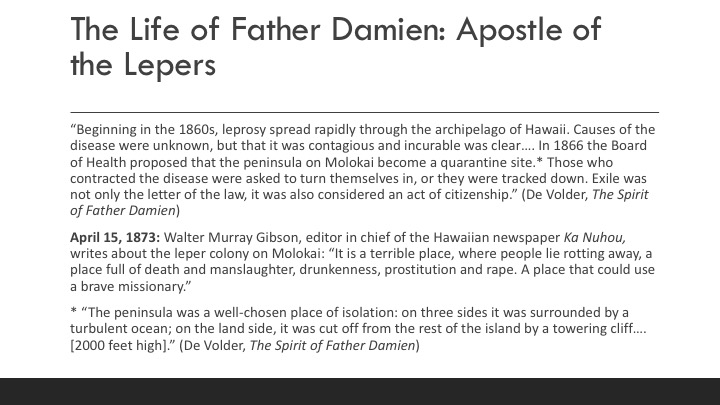
The Life of Father Damien: Apostle of the Lepers
“Beginning in the 1860s, leprosy spread rapidly through the archipelago of Hawaii. Causes of the disease were unknown, but that it was contagious and incurable was clear…. In 1866 the Board of Health proposed that the peninsula on Molokai become a quarantine site.* Those who contracted the disease were asked to turn themselves in, or they were tracked down. Exile was not only the letter of the law, it was also considered an act of citizenship.” (De Volder, The Spirit of Father Damien)
April 15, 1873: Walter Murray Gibson, editor in chief of the Hawaiian newspaper Ka Nuhou, writes about the leper colony on Molokai: “It is a terrible place, where people lie rotting away, a place full of death and manslaughter, drunkenness, prostitution and rape. A place that could use a brave missionary.”
* “The peninsula was a well-chosen place of isolation: on three sides it was surrounded by a turbulent ocean; on the land side, it was cut off from the rest of the island by a towering cliff…. [2000 feet high].” (De Volder, The Spirit of Father Damien)
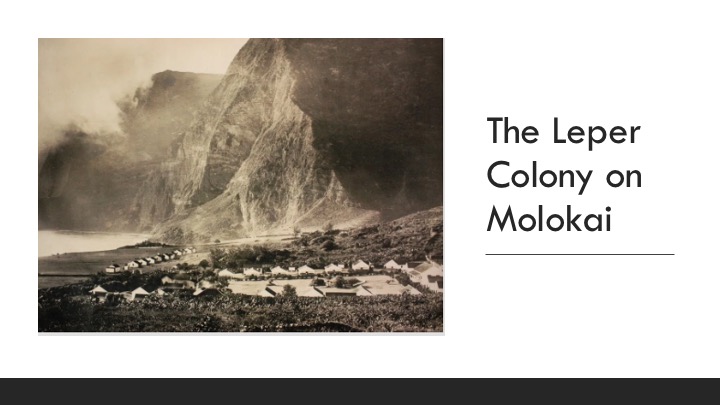
The isolation of the leper colony is obvious.
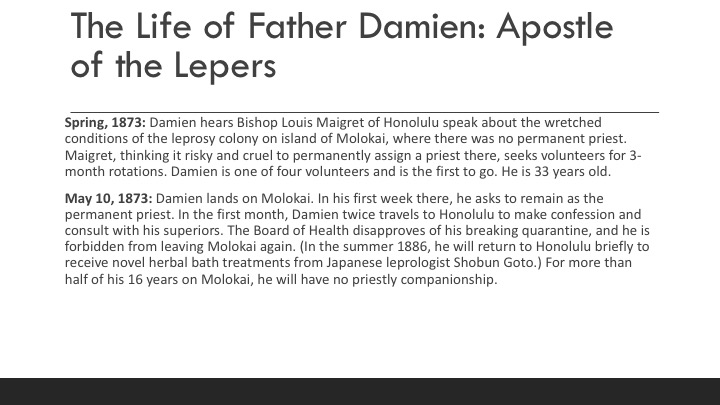
The Life of Father Damien: Apostle of the Lepers
Spring, 1873: Damien hears Bishop Louis Maigret of Honolulu speak about the wretched conditions of the leprosy colony on island of Molokai, where there was no permanent priest. Maigret, thinking it risky and cruel to permanently assign a priest there, seeks volunteers for 3-month rotations. Damien is one of four volunteers and is the first to go. He is 33 years old.
May 10, 1873: Damien lands on Molokai. In his first week there, he asks to remain as the permanent priest. In the first month, Damien twice travels to Honolulu to make confession and consult with his superiors. The Board of Health disapproves of his breaking quarantine, and he is forbidden from leaving Molokai again. (In the summer 1886, he will return to Honolulu briefly to receive novel herbal bath treatments from Japanese leprologist Shobun Goto.) For more than half of his 16 years on Molokai, he will have no priestly companionship.
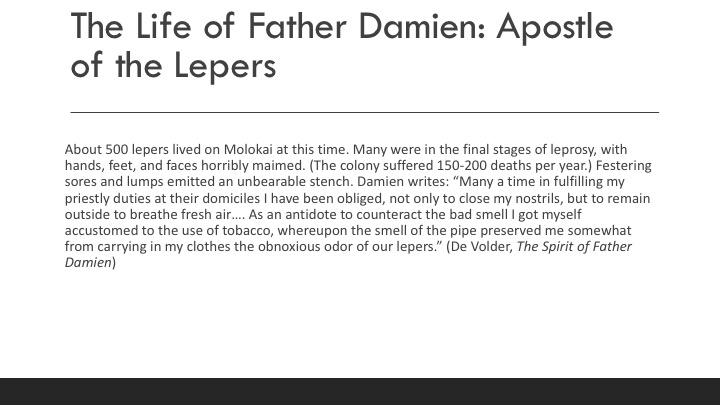
The Life of Father Damien: Apostle of the Lepers
About 500 lepers lived on Molokai at this time. Many were in the final stages of leprosy, with hands, feet, and faces horribly maimed. (The colony suffered 150-200 deaths per year.) Festering sores and lumps emitted an unbearable stench. Damien writes: “Many a time in fulfilling my priestly duties at their domiciles I have been obliged, not only to close my nostrils, but to remain outside to breathe fresh air…. As an antidote to counteract the bad smell I got myself accustomed to the use of tobacco, whereupon the smell of the pipe preserved me somewhat from carrying in my clothes the obnoxious odor of our lepers.” (De Volder, The Spirit of Father Damien)
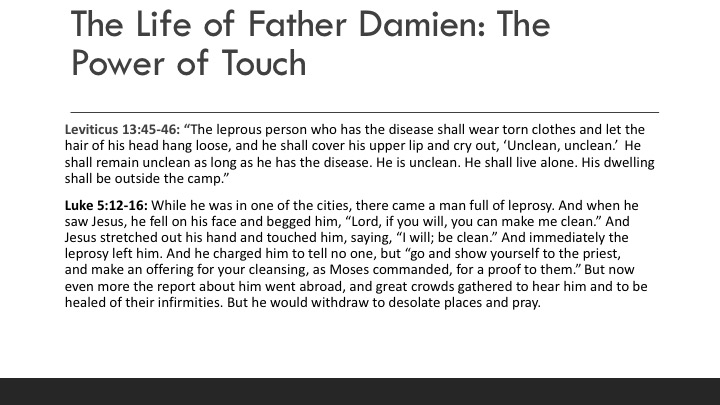
The Life of Father Damien: The Power of Touch
Leviticus 13:45-46: “The leprous person who has the disease shall wear torn clothes and let the hair of his head hang loose, and he shall cover his upper lip and cry out, ‘Unclean, unclean.’ He shall remain unclean as long as he has the disease. He is unclean. He shall live alone. His dwelling shall be outside the camp.”
Luke 5:12-16: While he was in one of the cities, there came a man full of leprosy. And when he saw Jesus, he fell on his face and begged him, “Lord, if you will, you can make me clean.” And Jesus stretched out his hand and touched him, saying, “I will; be clean.” And immediately the leprosy left him. And he charged him to tell no one, but “go and show yourself to the priest, and make an offering for your cleansing, as Moses commanded, for a proof to them.” But now even more the report about him went abroad, and great crowds gathered to hear him and to be healed of their infirmities. But he would withdraw to desolate places and pray.
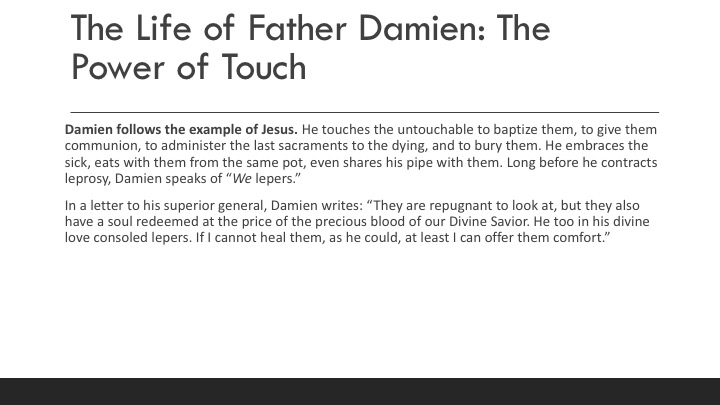
The Life of Father Damien: The Power of Touch
Father Damien follows the example of Jesus. He touches the untouchable to baptize them, to give them communion, to administer the last sacraments to the dying, and to bury them. He embraces the sick, eats with them from the same pot, even shares his pipe with them. Long before he contracts leprosy, Damien speaks of “We lepers.”
In a letter to his superior general, Damien writes: “They are repugnant to look at, but they also have a soul redeemed at the price of the precious blood of our Divine Savior. He too in his divine love consoled lepers. If I cannot heal them, as he could, at least I can offer them comfort.”
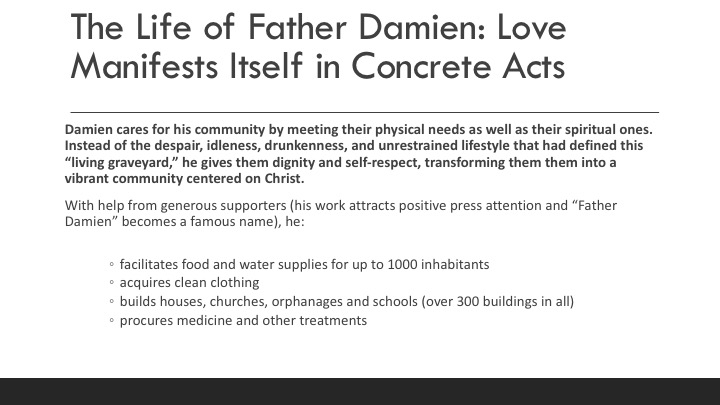
The Life of Father Damien: Love Manifests Itself in Concrete Acts
Damien cares for his community by meeting their physical needs as well as their spiritual ones. Instead of the despair, idleness, drunkenness, and unrestrained lifestyle that had defined this “living graveyard,” he gives them dignity and self-respect, transforming them them into a vibrant community centered on Christ.
With help from generous supporters (his work attracts positive press attention and “Father Damien” becomes a famous name), he:
- facilitates food and water supplies for up to 1000 inhabitants
- acquires clean clothing
- builds houses, churches, orphanages and schools (over 300 buildings in all)
- procures medicine and other treatments
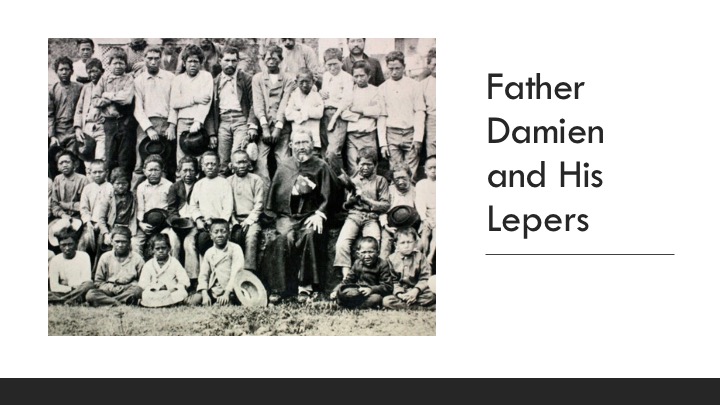
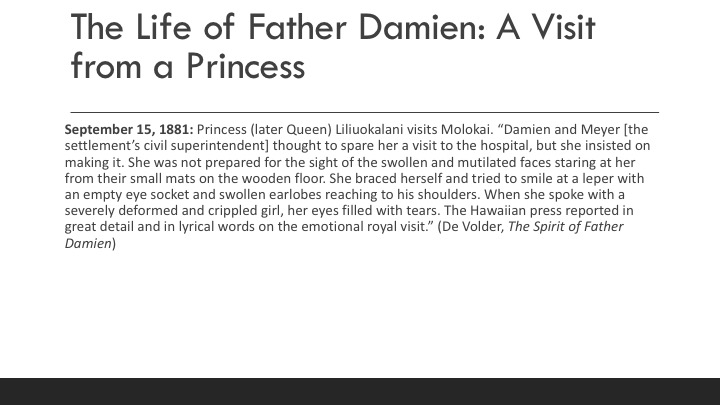
The Life of Father Damien: A Visit from a Princess
September 15, 1881: Princess (later Queen) Liliuokalani visits Molokai. “Damien and Meyer [the settlement’s civil superintendent] thought to spare her a visit to the hospital, but she insisted on making it. She was not prepared for the sight of the swollen and mutilated faces staring at her from their small mats on the wooden floor. She braced herself and tried to smile at a leper with an empty eye socket and swollen earlobes reaching to his shoulders. When she spoke with a severely deformed and crippled girl, her eyes filled with tears. The Hawaiian press reported in great detail and in lyrical words on the emotional royal visit.” (De Volder, The Spirit of Father Damien)
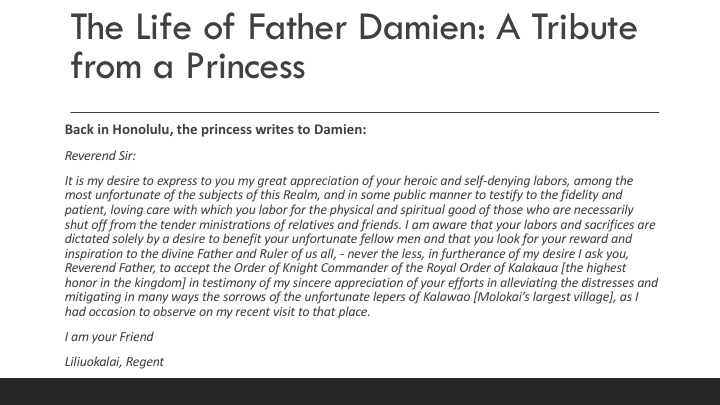
The Life of Father Damien: A Tribute from a Princess
Back in Honolulu, the princess writes to Damien:
Reverend Sir:
It is my desire to express to you my great appreciation of your heroic and self-denying labors, among the most unfortunate of the subjects of this Realm, and in some public manner to testify to the fidelity and patient, loving care with which you labor for the physical and spiritual good of those who are necessarily shut off from the tender ministrations of relatives and friends. I am aware that your labors and sacrifices are dictated solely by a desire to benefit your unfortunate fellow men and that you look for your reward and inspiration to the divine Father and Ruler of us all, - never the less, in furtherance of my desire I ask you, Reverend Father, to accept the Order of Knight Commander of the Royal Order of Kalakaua [the highest honor in the kingdom] in testimony of my sincere appreciation of your efforts in alleviating the distresses and mitigating in many ways the sorrows of the unfortunate lepers of Kalawao [Molokai’s largest village], as I had occasion to observe on my recent visit to that place.
I am your Friend
Liliuokalai, Regent
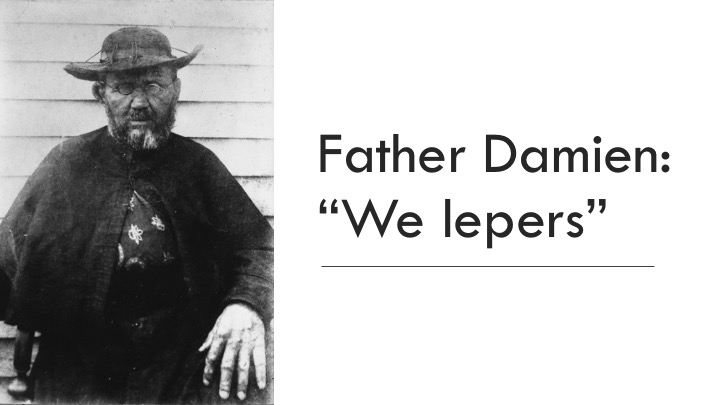
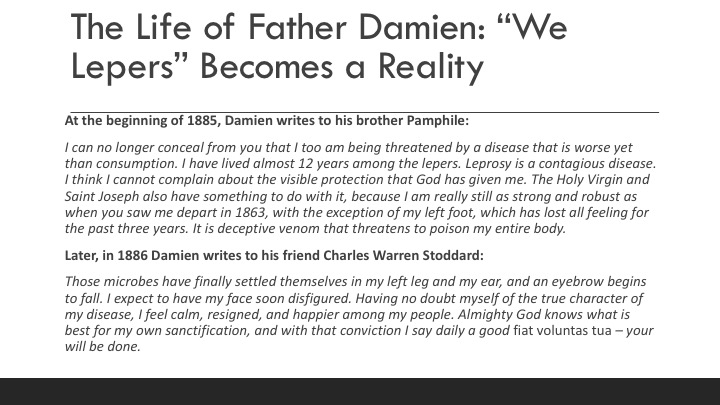
The Life of Father Damien: “We Lepers” Becomes a Reality
At the beginning of 1885, Damien writes to his brother Pamphile:
I can no longer conceal from you that I too am being threatened by a disease that is worse yet than consumption. I have lived almost 12 years among the lepers. Leprosy is a contagious disease. I think I cannot complain about the visible protection that God has given me. The Holy Virgin and Saint Joseph also have something to do with it, because I am really still as strong and robust as when you saw me depart in 1863, with the exception of my left foot, which has lost all feeling for the past three years. It is deceptive venom that threatens to poison my entire body.
Later, in 1886 Damien writes to his friend Charles Warren Stoddard:
Those microbes have finally settled themselves in my left leg and my ear, and an eyebrow begins to fall. I expect to have my face soon disfigured. Having no doubt myself of the true character of my disease, I feel calm, resigned, and happier among my people. Almighty God knows what is best for my own sanctification, and with that conviction I say daily a good fiat voluntas tua – your will be done.
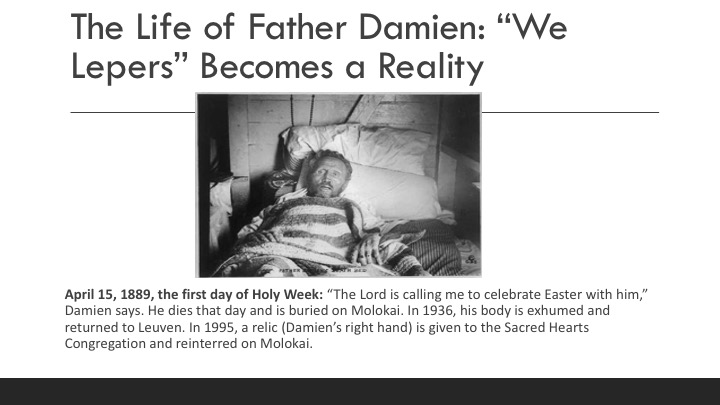
The Life of Father Damien: “We Lepers” Becomes a Reality
April 15, 1889, the first day of Holy Week: “The Lord is calling me to celebrate Easter with him,” Damien says. He dies that day and is buried on Molokai. In 1936, his body is exhumed and returned to Leuven. In 1995, a relic (Damien’s right hand) is given to the Sacred Hearts Congregation and reinterred on Molokai.
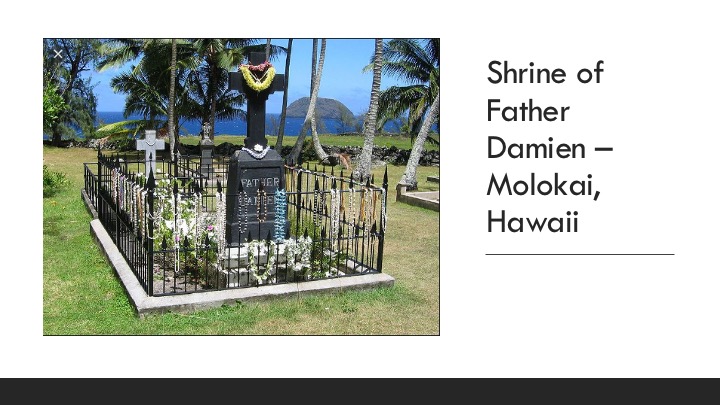

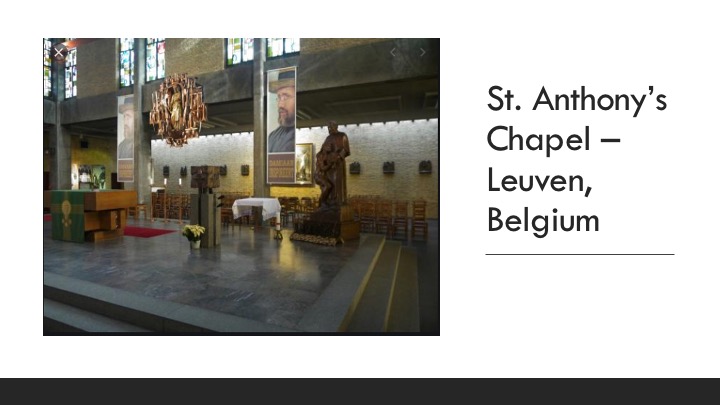
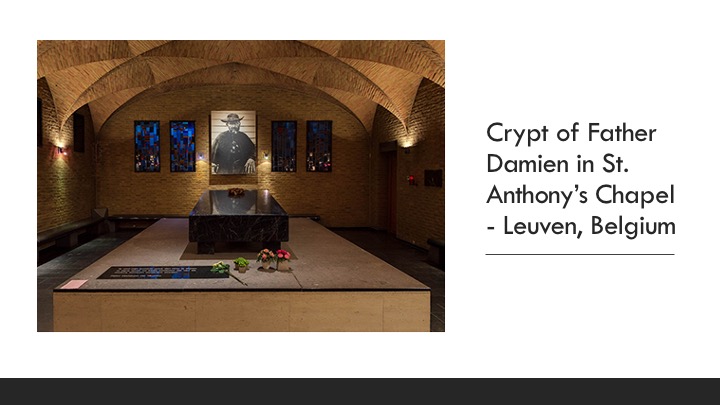
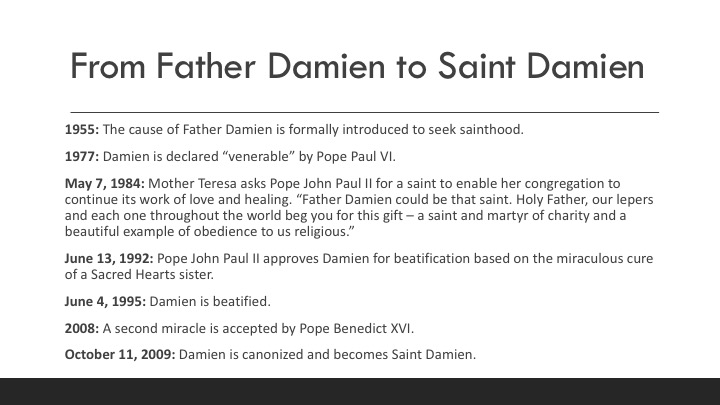
From Father Damien to Saint Damien
1955: The cause of Father Damien is formally introduced to seek sainthood.
1977: Damien is declared “venerable” by Pope Paul VI.
May 7, 1984: Mother Teresa asks Pope John Paul II for a saint to enable her congregation to continue its work of love and healing. “Father Damien could be that saint. Holy Father, our lepers and each one throughout the world beg you for this gift – a saint and martyr of charity and a beautiful example of obedience to us religious.”
June 13, 1992: Pope John Paul II approves Damien for beatification based on the miraculous cure of a Sacred Hearts sister.
June 4, 1995: Damien is beatified.
2008: A second miracle is accepted by Pope Benedict XVI.
October 11, 2009: Damien is canonized and becomes Saint Damien.
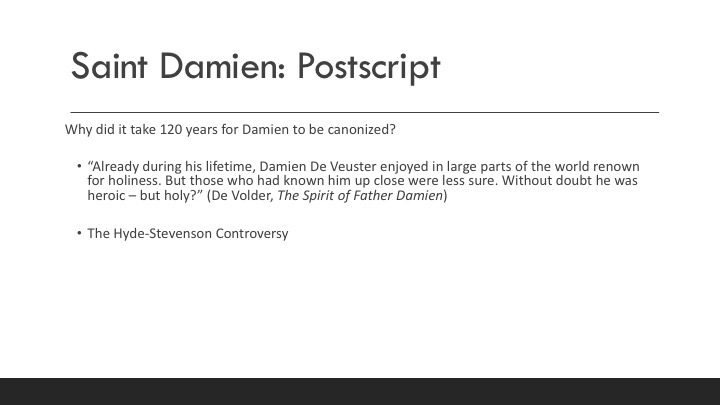
Saint Damien: Postscript
Why did it take 120 years for Damien to be canonized?
•“Already during his lifetime, Damien De Veuster enjoyed in large parts of the world renown for holiness. But those who had known him up close were less sure. Without doubt he was heroic – but holy?” (De Volder, The Spirit of Father Damien)
•The Hyde-Stevenson Controversy
This concludes the class presentation but interested readers should read in more detail about the Hyde - Stevenson Controversy. Stevenson was Robert Louis Stevenson (remember "Treasure Island")
The Hyde-Stevenson Controversy
You cannot appreciate the Hyde-Stevenson Controversy regarding the canonization of Father Damien unless you read the open letter that Robert Louis Stevenson wrote to Rev. Charles Hyde of Honolulu, a Presbyterian minister who had written a highly critical letter about Father Damien (a Catholic Priest). Stevenson (also a Presbyterian) was so revolted by what Hyde had written, that he visited Molokai and interviewed many people there to ascertain if these things that Hyde wrote were true.
The letter is reproduced below. You cannot miss this! The letter is almost savage and is a wonderful example of how savage a man of letters could be when aroused. Stevenson was determined to set the record straight and his command of English and argumentation is a thing to behold.
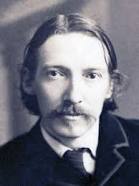
Robert Louis Stevenson was a Scottish novelist, poet and travel writer, most noted for Treasure Island, Kidnapped, Strange Case of Dr Jekyll and Mr Hyde, and A Child's Garden of Verses.
AN OPEN LETTER TO THE REVEREND DR. HYDE OF HONOLULU
by Robert Louis Stevenson
SYDNEY FEBRUARY 25, 1890.
SIR,
It may probably occur to you that we have met, and visited, and conversed; on my side, with interest. You may remember that you have done me several courtesies, for which I was prepared to be grateful. But there are duties which come before gratitude, and offences which justly divide friends, far more acquaintances.
Your letter to the Reverend H. B. Gage is a document which, in my sight, if you had filled me with bread when I was starving, if you had sat up to nurse my father when he lay a-dying, would yet absolve me from the bonds of gratitude. You know enough, doubtless, of the process of canonization to be aware that, a hundred years after the death of Damien, there will appear a man charged with the painful office of the DEVIL’S ADVOCATE. After that noble brother of mine, and of all frail clay, shall have lain a century at rest, one shall accuse, one defend him.
The circumstance is unusual that the devil’s advocate should be a volunteer, should be a member of a sect immediately rival, and should make haste to take upon himself his ugly office ere the bones are cold; unusual, and of a taste which I shall leave my readers free to qualify; unusual, and to me inspiring. If I have at all learned the trade of using words to convey truth and to arouse emotion, you have at last furnished me with a subject. For it is in the interest of all mankind, and the cause of public decency in every quarter of the world, not only that Damien should be righted, but that you and your letter should be displayed at length, in their true colours, to the public eye.
To do this properly, I must begin by quoting you at large: I shall then proceed to criticize your utterance from several points of view, divine and human, in the course of which I shall attempt to draw again, and with more specification, the character of the dead saint whom it has pleased you to vilify: so much being done, I shall say farewell to you for ever.
THE LETTER OF CHARLES HYDE HONOLULU AUGUST 2, 1889 TO REV. H. B. GAGE of SAN FRANCISCO
DEAR BROTHER,
In answer to your inquiries about Father Damien, I can only reply that we who knew the man are surprised at the extravagant newspaper laudations, as if he was a most saintly philanthropist. The simple truth is, he was a coarse, dirty man, headstrong and bigoted. He was not sent to Molokai, but went there without orders; did not stay at the leper settlement (before he became one himself), but circulated freely over the whole island (less than half the island is devoted to the lepers), and he came often to Honolulu. He had no hand in the reforms and improvements inaugurated, which were the works of our Board of Health, as occasion required and means were provided. He was not a pure man in his relations with women, and the leprosy of which he died should be attributed to his vices and carelessness. Others have done much for the lepers, our own ministers, the government physicians, and so forth, but never with the Catholic idea of meriting eternal life. - Yours, etc., ‘C. M. HYDE.’
STEVENSON CONTINUES:
(1) To deal fitly with a letter so extraordinary, I must draw at the outset on my private knowledge of the signatory and his sect. It may offend others; scarcely you, who have been so busy to collect, so bold to publish, gossip on your rivals. And this is perhaps the moment when I may best explain to you the character of what you are to read: I conceive you as a man quite beyond and below the reticence of civility: with what measure you mete, with that shall it be measured you again; with you, at last, I rejoice to feel the button off the foil and to plunge home. And if in aught that I shall say I should offend others, your colleagues, whom I respect and remember with affection, I can but offer them my regret; I am not free, I am inspired by the consideration of interests far more large; and such pain as can be inflicted by anything from me must be indeed trifling when compared with the pain with which they read your letter. It is not the hangman, but the criminal, that brings dishonour on the house.
You belong, sir, to a sect - I believe my sect, and that in which my ancestors laboured - which has enjoyed, and partly failed to utilize, an exceptional advantage in the islands of Hawaii. The first missionaries came; they found the land already self-purged of its old and bloody faith; they were embraced, almost on their arrival, with enthusiasm; what troubles they supported came far more from whites than from Hawaiians; and to these last they stood (in a rough figure) in the shoes of God. This is not the place to enter into the degree or causes of their failure, such as it is. One element alone is pertinent, and must here be plainly dealt with. In the course of their evangelical calling, they - or too many of them - grew rich. It may be news to you that the houses of missionaries are a cause of mocking on the streets of Honolulu. It will at least be news to you, that when I returned your civil visit, the driver of my cab commented on the size, the taste, and the comfort of your home. It would have been news certainly to myself, had any one told me that afternoon that I should live to drag such matter into print. But you see, sir, how you degrade better men to your own level; and it is needful that those who are to judge betwixt you and me, betwixt Damien and the devil’s advocate, should understand your letter to have been penned in a house which could raise, and that very justly, the envy and the comments of the passers-by. I think (to employ a phrase of yours which I admire) it ‘should be attributed’ to you that you have never visited the scene of Damien’s life and death. If you had, and had recalled it, and looked about your pleasant rooms, even your pen perhaps would have been stayed.
Your sect (and remember, as far as any sect avows me, it is mine) has not done ill in a worldly sense in the Hawaiian Kingdom. When calamity befell their innocent parishioners, when leprosy descended and took root in the Eight Islands, a QUID PRO QUO was to be looked for. To that prosperous mission, and to you, as one of its adornments, God had sent at last an opportunity. I know I am touching here upon a nerve acutely sensitive. I know that others of your colleagues look back on the inertia of your Church, and the intrusive and decisive heroism of Father Damien, with something almost to be called remorse. I am sure it is so with yourself; I am persuaded your letter was inspired by certain envy, not essentially ignoble, and the one human trait to be espied in that performance. You were thinking of the lost chance, the past day; of that which should have been conceived and was not; of the service due and not rendered. Time was, said the voice in your ear, in your pleasant room, as you sat raging and writing; and if the words written were base beyond parallel, the rage, I am happy to repeat - it is the only compliment I shall pay you - the rage was almost virtuous. But, sir, when we have failed, and another has succeeded; when we have stood by, and another has stepped in; when we sit and grow bulky in our charming mansions, and a plain, uncouth peasant steps into the battle, under the eyes of God, and succours the afflicted, and consoles the dying, and is himself afflicted in his turn, and dies upon the field of honour - the battle cannot be retrieved as your unhappy irritation has suggested. It is a lost battle, and lost forever. One thing remained to you in your defeat - some rags of common honour; and these you have made haste to cast away. Common honour; not the honour of having done anything right, but the honour of not having done aught conspicuously foul; the honour of the inert: that was what remained to you. We are not all expected to be Damiens; a man may conceive his duty more narrowly, he may love his comforts better; and none will cast a stone at him for that.
But will a gentleman of your reverend profession allow me an example from the fields of gallantry? When two gentlemen compete for the favour of a lady, and the one succeeds and the other is rejected, and (as will sometimes happen) matter damaging to the successful rival’s credit reaches the ear of the defeated, it is held by plain men of no pretensions that his mouth is, in the circumstance, almost necessarily closed. Your Church and Damien’s were in Hawaii upon a rivalry to do well: to help, to edify, to set divine examples. You having (in one huge instance) failed, and Damien succeeded, I marvel it should not have occurred to you that you were doomed to silence; that when you had been outstripped in that high rivalry, and sat inglorious in the midst of your well- being, in your pleasant room - and Damien, crowned with glories and horrors, toiled and rotted in that pigsty of his under the cliffs of Kalawao - you, the elect who would not, were the last man on earth to collect and propagate gossip on the volunteer who would and did.
I think I see you - for I try to see you in the flesh as I write these sentences - I think I see you leap at the word pigsty, a hyperbolical expression at the best. ‘He had no hand in the reforms,’ he was ‘a coarse, dirty man’; these were your own words; and you may think it possible that I am come to support you with fresh evidence.
In a sense, it is even so.
Damien has been too much depicted with a conventional halo and conventional features; so drawn by men who perhaps had not the eye to remark or the pen to express the individual; or who perhaps were only blinded and silenced by generous admiration, such as I partly envy for myself - such as you, if your soul were enlightened, would envy on your bended knees. It is the least defect of such a method of portraiture that it makes the path easy for the devil’s advocate, and leaves for the misuse of the slanderer a considerable field of truth. For the truth that is suppressed by friends is the readiest weapon of the enemy.
The world, in your despite, may perhaps owe you something, if your letter be the means of substituting once for all a credible likeness for a wax abstraction. For, if that world at all remember you, on the day when Damien of Molokai shall be named Saint, it will be in virtue of one work: your letter to the Reverend H. B. Gage.
You may ask on what authority I speak. It was my inclement destiny to become acquainted, not with Damien, but with Dr. Hyde. When I visited the lazaretto, Damien was already in his resting grave. But such information as I have, I gathered on the spot in conversation with those who knew him well and long: some indeed who revered his memory; but others who had sparred and wrangled with him, who beheld him with no halo, who perhaps regarded him with small respect, and through whose unprepared and scarcely partial communications the plain, human features of the man shone on me convincingly. These gave me what knowledge I possess; and I learnt it in that scene where it could be most completely and sensitively understood - Kalawao, which you have never visited, about which you have never so much as endeavoured to inform yourself; for, brief as your letter is, you have found the means to stumble into that confession.
‘LESS THAN ONE-- HALF of the island,’ you say, ‘is devoted to the lepers.’
Molokai - ‘MOLOKAI AHINA,’ the ‘grey,’ lofty, and most desolate island - along all its northern side plunges a front of precipice into a sea of unusual profundity. This range of cliff is, from east to west, the true end and frontier of the island. Only in one spot there projects into the ocean a certain triangular and rugged down, grassy, stony, windy, and rising in the midst into a hill with a dead crater: the whole bearing to the cliff that overhangs it somewhat the same relation as a bracket to a wall. With this hint you will now be able to pick out the leper station on a map; you will be able to judge how much of Molokai is thus cut off between the surf and precipice, whether less than a half, or less than a quarter, or a fifth, or a tenth - or, say, a twentieth; and the next time you burst into print you will be in a position to share with us the issue of your calculations.
I imagine you to be one of those persons who talk with cheerfulness of that place which oxen and wain-ropes could not drag you to behold. You, who do not even know its situation on the map, probably denounce sensational descriptions, stretching your limbs the while in your pleasant parlour on Beretania Street. When I was pulled ashore there one early morning, there sat with me in the boat two sisters, bidding farewell (in humble imitation of Damien) to the lights and joys of human life. One of these wept silently; I could not withhold myself from joining her. Had you been there, it is my belief that nature would have triumphed even in you; and as the boat drew but a little nearer, and you beheld the stairs crowded with abominable deformations of our common manhood, and saw yourself landing in the midst of such a population as only now and then surrounds us in the horror of a nightmare - what a haggard eye you would have rolled over your reluctant shoulder towards the house on Beretania Street!
Had you gone on; had you found every fourth face a blot upon the landscape; had you visited the hospital and seen the butt-ends of human beings lying there almost unrecognizable, but still breathing, still thinking, still remembering; you would have understood that life in the lazaretto is an ordeal from which the nerves of a man’s spirit shrink, even as his eye quails under the brightness of the sun; you would have felt it was (even to-day) a pitiful place to visit and a hell to dwell in. It is not the fear of possible infection. That seems a little thing when compared with the pain, the pity, and the disgust of the visitor’s surroundings, and the atmosphere of affliction, disease, and physical disgrace in which he breathes.
I do not think I am a man more than usually timid; but I never recall the days and nights I spent upon that island promontory (eight days and seven nights), without heartfelt thankfulness that I am somewhere else. I find in my diary that I speak of my stay as a ‘grinding experience’: I have once jotted in the margin, ‘HARROWING is the word’; and when the MOKOLII bore me at last towards the outer world, I kept repeating to myself, with a new conception of their pregnancy, those simple words of the song -‘’Tis the most distressful country that ever yet was seen.’ And observe: that which I saw and suffered from was a settlement purged, bettered, beautified; the new village built, the hospital and the Bishop-Home excellently arranged; the sisters, the doctor, and the missionaries, all indefatigable in their noble tasks. It was a different place when Father Damien came there and made his great renunciation, and slept that first night under a tree amidst his rotting brethren: alone with pestilence; and looking forward (with what courage, with what pitiful sinkings of dread, God only knows) to a lifetime of dressing sores and stumps.
You will say, perhaps, I am too sensitive, that sights as painful abound in cancer hospitals and are confronted daily by doctors and nurses. I have long learned to admire and envy the doctors and the nurses. But there is no cancer hospital so large and populous as Kalawao and Kalaupapa; and in such a matter every fresh case, like every inch of length in the pipe of an organ, deepens the note of the impression; for what daunts the onlooker is that monstrous sum of human suffering by which he stands surrounded. Lastly, no doctor or nurse is called upon to enter once for all the doors of that gehenna; they do not say farewell, they need not abandon hope, on its sad threshold; they but go for a time to their high calling, and can look forward as they go to relief, to recreation, and to rest. But Damien shut-to with his own hand the doors of his own sepulcher.
I shall now extract three passages from my diary at Kalawao.
A. ‘Damien is dead and already somewhat ungratefully remembered in the field of his labours and sufferings. "He was a good man, but very officious," says one. Another tells me he had fallen (as other priests so easily do) into something of the ways and habits of thought of a Kanaka; but he had the wit to recognize the fact, and the good sense to laugh at’ [over] ‘it. A plain man it seems he was; I cannot find he was a popular.’
B. ‘After Ragsdale’s death’ [Ragsdale was a famous Luna, or overseer, of the unruly settlement] ‘there followed a brief term of office by Father Damien which served only to publish the weakness of that noble man. He was rough in his ways, and he had no control. Authority was relaxed; Damien’s life was threatened, and he was soon eager to resign.’
C. ‘Of Damien I begin to have an idea. He seems to have been a man of the peasant class, certainly of the peasant type: shrewd, ignorant and bigoted, yet with an open mind, and capable of receiving and digesting a reproof if it were bluntly administered; superbly generous in the least thing as well as in the greatest, and as ready to give his last shirt (although not without human grumbling) as he had been to sacrifice his life; essentially indiscreet and officious, which made him a troublesome colleague; domineering in all his ways, which made him incurably unpopular with the Kanakas, but yet destitute of real authority, so that his boys laughed at him and he must carry out his wishes by the means of bribes. He learned to have a mania for doctoring; and set up the Kanakas against the remedies of his regular rivals: perhaps (if anything matter at all in the treatment of such a disease) the worst thing that he did, and certainly the easiest. The best and worst of the man appear very plainly in his dealings with Mr. Chapman’s money; he had originally laid it out’ [intended to lay it out] ‘entirely for the benefit of Catholics, and even so not wisely; but after a long, plain talk, he admitted his error fully and revised the list. The sad state of the boys’ home is in part the result of his lack of control; in part, of his own slovenly ways and false ideas of hygiene. Brother officials used to call it "Damien’s Chinatown." "Well," they would say, "your China-town keeps growing." And he would laugh with perfect good nature, and adhere to his errors with perfect obstinacy. So much I have gathered of truth about this plain, noble human brother and father of ours; his imperfections are the traits of his face, by which we know him for our fellow; his martyrdom and his example nothing can lessen or annul; and only a person here on the spot can properly appreciate their greatness.’
I have set down these private passages, as you perceive, without correction; thanks to you, the public has them in their bluntness. They are almost a list of the man’s faults, for it is rather these that I was seeking: with his virtues, with the heroic profile of his life, I and the world were already sufficiently acquainted. I was besides a little suspicious of Catholic testimony; in no ill sense, but merely because Damien’s admirers and disciples were the least likely to be critical. I know you will be more suspicious still; and the facts set down above were one and all collected from the lips of Protestants who had opposed the father in his life.
Stevenson's Letter on Father Damien (cont.)
Yet I am strangely deceived, for they build up the image of a man, with all his weaknesses, essentially heroic, and alive with rugged honesty, generosity, and mirth. Take it for what it is, rough private jottings of the worst sides of Father Damien’s character, collected from the lips of those who had laboured with and (in your own phrase) ‘knew the man’; - though I question whether Damien would have said that he knew you. Take it, and observe with wonder how well you were served by your gossips, how ill by your intelligence and sympathy; in how many points of fact we are at one, and how widely our appreciations vary. There is something wrong here; either with you or me. It is possible, for instance, that you, who seem to have so many ears in Kalawao, had heard of the affair of Mr. Chapman’s money, and were singly struck by Father Damien’s intended wrong-doing. I was struck with that also, and set it fairly down; but I was struck much more by the fact that he had the honesty of mind to be convinced.
I may here tell you that it was a long business; that one of his colleagues sat with him late into the night, multiplying arguments and accusations; that the father listened as usual with ‘perfect good-nature and perfect obstinacy’; but at the last, when he was persuaded - ‘Yes,’ said he, ‘I am very much obliged to you; you have done me a service; it would have been a theft.’ There are many (not Catholics merely) who require their heroes and saints to be infallible; to these the story will be painful; not to the true lovers, patrons, and servants of mankind.
And I take it, this is a type of our division; that you are one of those who have an eye for faults and failures; that you take a pleasure to find and publish them; and that, having found them, you make haste to forget the overvailing virtues and the real success which had alone introduced them to your knowledge. It is a dangerous frame of mind. That you may understand how dangerous, and into what a situation it has already brought you, we will (if you please) go hand- in-hand through the different phrases of your letter, and candidly examine each from the point of view of its truth, its appositeness, and its charity.
Father Damien was COARSE
It is very possible. You make us sorry for the lepers, who had only a coarse old peasant for their friend and father. But you, who were so refined, why were you not there, to cheer them with the lights of culture? Or may I remind you that we have some reason to doubt if John the Baptist were genteel; and in the case of Peter, on whose career you doubtless dwell approvingly in the pulpit, no doubt at all he was a ‘coarse, headstrong’ fisherman! Yet even in our Protestant Bibles Peter is called Saint.
Father Damien was DIRTY.
He was. Think of the poor lepers annoyed with this dirty comrade! But the clean Dr. Hyde was at his food in a fine house.
Father Damien was HEADSTRONG.
I believe you are right again; and I thank God for his strong head and heart.
Father Damien was BIGOTED.
I am not fond of bigots myself, because they are not fond of me. But what is meant by bigotry, that we should regard it as a blemish in a priest? Damien believed his own religion with the simplicity of a peasant or a child; as I would I could suppose that you do. For this, I wonder at him some way off; and had that been his only character, should have avoided him in life. But the point of interest in Father Damien, which has caused him to be so much talked about and made him at last the subject of your pen and mine, was that, in him, his bigotry, his intense and narrow faith, wrought potently for good, and strengthened him to be one of the world’s heroes and exemplars.
Father Damien WAS NOT SENT TO MOLOKAI, BUT WENT THERE WITHOUT ORDERS.
Is this a misreading? Or do you really mean the words for blame? I have heard Christ, in the pulpits of our Church, held up for imitation on the ground that His sacrifice was voluntary. Does Dr. Hyde think otherwise?
Father Damien DID NOT STAY AT THE SETTLEMENT, ETC.
It is true he was allowed many indulgences. Am I to understand that you blame the father for profiting by these, or the officers for granting them? In either case, it is a mighty Spartan standard to issue from the house on Beretania Street; and I am convinced you will find yourself with few supporters.
Father Damien HAD NO HAND IN THE REFORMS, ETC.
I think even you will admit that I have already been frank in my description of the man I am defending; but before I take you up upon this head, I will be franker still, and tell you that perhaps nowhere in the world can a man taste a more pleasurable sense of contrast than when he passes from Damien’s ‘Chinatown’ at Kalawao to the beautiful Bishop- Home at Kalaupapa. At this point, in my desire to make all fair for you, I will break my rule and adduce Catholic testimony.
Here is a passage from my diary about my visit to the Chinatown, from which you will see how it is (even now) regarded by its own officials: ‘We went round all the dormitories, refectories, etc. - dark and dingy enough, with a superficial cleanliness, which he’ [Mr. Dutton, the lay- brother] ‘did not seek to defend. "It is almost decent," said he; "the sisters will make that all right when we get them here."’ And yet I gathered it was already better since Father Damien was dead, and far better than when he was there alone and had his own (not always excellent) way. I have now come far enough to meet you on a common ground of fact; and I tell you that, to a mind not prejudiced by jealousy, all the reforms of the lazaretto, and even those which he most vigorously opposed, are properly the work of Father Damien.
They are the evidence of his success; they are what his heroism provoked from the reluctant and the careless. Many were before him in the field; Mr. Meyer, for instance, of whose faithful work we hear too little: there have been many since; and some had more worldly wisdom, though none had more devotion, than our saint. Before his day, even you will confess, they had affected little. It was his part, by one striking act of martyrdom, to direct all men’s eyes on that distressful country. At a blow, and with the price of his life, he made the place illustrious and public. And that, if you will consider largely, was the one reform needful; pregnant of all that should succeed. It brought money; it brought (best individual addition of them all) the sisters; it brought supervision, for public opinion and public interest landed with the man at Kalawao. If ever any man brought reforms, and died to bring them, it was he. There is not a clean cup or towel in the Bishop-Home, but dirty Damien washed it.
Father Damien WAS NOT A PURE MAN IN HIS RELATIONS WITH WOMEN, ETC.
How do you know that? Is this the nature of the conversation in that house on Beretania Street which the cabman envied, driving past? - racy details of the misconduct of the poor peasant priest, toiling under the cliffs of Molokai? Many have visited the station before me; they seem not to have heard the rumour. When I was there I heard many shocking tales, for my informants were men speaking with the plainness of the laity; and I heard plenty of complaints of Father Damien. Why was this never mentioned? And how came it to you in the retirement of your clerical parlour? But I must not even seem to deceive you. This scandal, when I read it in your letter, was not new to me. I had heard it once before; and I must tell you how. There came to Samoa a man from Honolulu; he, in a public-house on the beach, volunteered the statement that Damien had ‘contracted the disease from having connection with the female lepers’; and I find a joy in telling you how the report was welcomed in a public-house. A man sprang to his feet; I am not at liberty to give his name, but from what I heard I doubt if you would care to have him to dinner in Beretania Street. ‘You miserable little - ‘(here is a word I dare not print, it would so shock your ears) - ‘You miserable little -,’ he cried, ‘if the story were a thousand times true, can’t you see you are a million times a lower - for daring to repeat it?’
I wish it could be told of you that when the report reached you in your house, perhaps after family worship, you had found in your soul enough holy anger to receive it with the same expressions; ay, even with that one which I dare not print; it would not need to have been blotted away, like Uncle Toby’s oath, by the tears of the recording angel; it would have been counted to you for your brightest righteousness. But you have deliberately chosen the part of the man from Honolulu, and you have played it with improvements of your own. The man from Honolulu - miserable, leering creature - communicated the tale to a rude knot of beach-combing drinkers in a public-house, where (I will so far agree with your temperance opinions) man is not always at his noblest; and the man from Honolulu had himself been drinking - drinking, we may charitably fancy, to excess.
It was to your ‘Dear Brother, the Reverend H. B. Gage,’ that you chose to communicate the sickening story; and the blue ribbon which adorns your portly bosom forbids me to allow you the extenuating plea that you were drunk when it was done. Your ‘dear brother’ - a brother indeed - made haste to deliver up your letter (as a means of grace, perhaps) to the religious papers; where, after many months, I found and read and wondered at it; and whence I have now reproduced it for the wonder of others. And you and your dear brother have, by this cycle of operations, built up a contrast very edifying to examine in detail. The man whom you would not care to have to dinner, on the one side; on the other, the Reverend Dr. Hyde and the Reverend H. B. Gage: the Apia barroom, the Honolulu manse.
But I fear you scarce appreciate how you appear to your fellowmen; and to bring it home to you, I will suppose your story to be true. I will suppose - and God forgive me for supposing it - that Damien faltered and stumbled in his narrow path of duty; I will suppose that, in the horror of his isolation, perhaps in the fever of incipient disease, he, who was doing so much more than he had sworn, failed in the letter of his priestly oath - he, who was so much a better man than either you or me, who did what we have never dreamed of daring - he too tasted of our common frailty. ‘O, Iago, the pity of it!’ The least tender should be moved to tears; the most incredulous to prayer. And all that you could do was to pen your letter to the Reverend H. B. Gage!
Is it growing at all clear to you what a picture you have drawn of your own heart? I will try yet once again to make it clearer. You had a father: suppose this tale were about him, and some informant brought it to you, proof in hand: I am not making too high an estimate of your emotional nature when I suppose you would regret the circumstance? That you would feel the tale of frailty the more keenly since it shamed the author of your days? And that the last thing you would do would be to publish it in the religious press? Well, the man who tried to do what Damien did, is my father, and the father of the man in the Apia bar, and the father of all who love goodness; and he was your father too, if God had given you grace to see it.
Robert Louis Stevenson
(1) From the Sydney PRESBYTERIAN, October 26, 1889.